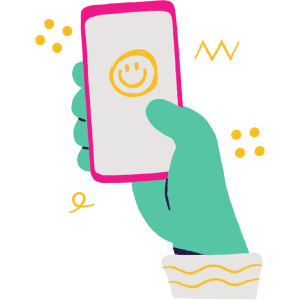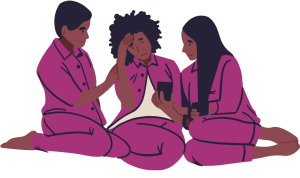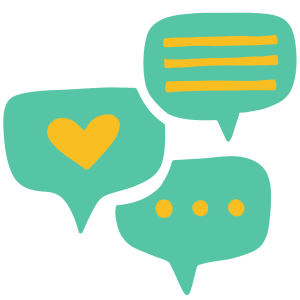Your mental health is just as important as your physical health. It affects how you feel, think, and act. Below are some tools to help you manage your mental health along with resources to get help.
Self-Care
Self-care is the process of taking the time for yourself to improve your mood and well-being. Put yourself on your to-do list! Set aside 15 minutes each day to practice self-care. Don’t know where to start? Try one of the ideas below.
 Spend time outdoors. Fresh air and sunshine increases serotonin in your body.
Spend time outdoors. Fresh air and sunshine increases serotonin in your body.
Physical activity. Exercise not only gets you physically fit, but it’s a natural way to help decrease depression and anxiety and provides the body with dopamine.
Meditation or mindful breathing. Mindful meditation and breathing promotes relaxation while reducing anxiety, depression and stress. Meditation or mindful breathing can also help you focus.
Creative expression. Channel your emotions through an art form such as journaling, painting, dancing, or singing to music.
Get enough sleep. Set yourself up for success by creating an enjoyable bedtime routine and avoiding screen time 30 minutes before bed.
Connect with others. Message your friend about what is bothering you or meet up with friends to do something fun together.
Disconnect from social media and the news. Sometimes this is hard to do, but your mind needs a break. Adjust your notifications or set a timer on your apps to limit exposure. You can also put your phone on “do not disturb” mode.
Mental Health Apps
Below are a few of our favorite free or free-download mental health apps.
What’s Up for overall mental health. Uses Cognitive Behavioral Therapy and Acceptance Commitment Therapy. Available for free on iOS and Android.
Moodfit for overall mental health. Customizable mental health tools. Mostly free, some features behind a paywall. Available on iOS and Android.
The Safe Place is a minority mental health app geared towards the Black community. Available for free on iOS and Android.
 Smiling Mind includes daily meditation and mindfulness exercises. Available for free on iOS and Android.
Smiling Mind includes daily meditation and mindfulness exercises. Available for free on iOS and Android.
Bearable is a great tracking app for mood, symptoms, daily activities and more. Available for free with in-app purchases on iOS and Android.
Calm Harm helps with preventing self-harm. Available for free on iOS and Android.
MindShift helps with anxiety using Cognitive Behavioral Therapy. Available for free on iOS and Android.
CBT Thought Diary helps with anxiety through journaling and Cognitive Behavioral Therapy. Available for free on iOS and Android.
eMoods helps with bipolar disorder through mood tracking. Available for free with in-app purchases on iOS and Android.
Todoist helps with ADHD task organization. A limited number of tasks are free, and the app requires a monthly subscription. Available on iOS and Android.
Recovery Record helps with eating disorders. Available for free on iOS and Android.
nOCD helps with OCD. Available for free on iOS.
When to Ask for Help
It’s time to ask for help when our difficulties with feelings, emotions, thinking or behaviors:
- Last more than two weeks.
- Are too intense or cause too much distress.
- Interfere with daily life. You are having difficulty sleeping, eating, concentrating, working, enjoying things you normally enjoy, or relating to others.
- Cause you to withdraw from your relationships.
- Cause you to misuse alcohol or drugs, have thoughts of self-harm, or have aggressive behaviors.
Who to Ask for Help
Option 1: Talk to a Trusted Adult

Think about the adults in your life you trust, who will understand you, and will support your mental health. Write down your feelings in a letter, send a text or email, or take a buddy with you to ask an adult for help.
Option 2: Call a Warmline
A warmline is a phone number you call to have a conversation with a trained peer who can provide you with support during hard times. Call the MDHHS Certified Peer Support Specialist Warmline at 888-733-7753. Someone is available to help from 10:00 AM-2:00 AM, seven days a week.
Option 3: Talk to a Doctor or Therapist
Medical professionals like your doctor or a therapist will ask you questions, listen, and discuss your available treatment and support options. In Michigan, children who are 14 years of age and older have the right to get up to four months or 12 weeks of counseling without parental consent.
Websites to find a therapist for teens:
Crisis Resources
These resources are for when things become too hard, and you are not sure how to make it through the day.
 Apps
Apps
notOK App is a free digital panic button to get you immediate support via text, phone call, or GPS location when you’re struggling to reach out.
Online Chat
- 988 Suicide & Crisis Lifeline live online chat
- IMAlive free online chat
- Common Ground Crisis online chat
- The Trevor Project online chat
Text Messaging
- 988 Suicide & Crisis lifeline: text or call 988
- Seize the Awkward text service: text “SEIZE” to 741-741
- The Trevor Project text service: text “START” to 678-678



Add a comment to: Mental Health Resources for Teens